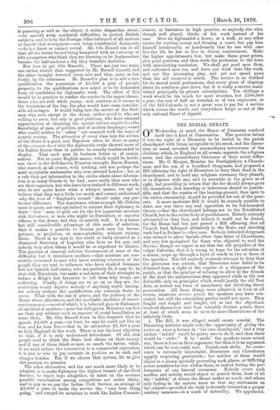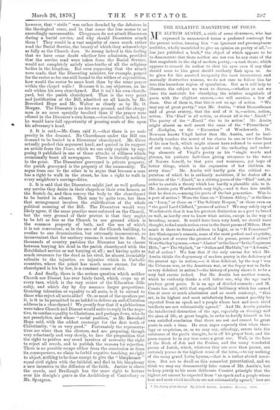THE BURIAL DEBATE.
ON Wednesday, as usual, the House of Commons resolved itself into a kind of Convocation. The question before it was the right of a Dissenter to be buried in the parish churchyard with forms acceptable to his creed, and the discus- sion, as usual, revealed the extraordinary narrowness of the divisions which, in England at all events, separate the religious sects, and the extraordinary bitterness of their social differ- ences. Mr. 0. Morgan, Member for Denbighshire, a Church- man, and the son of a beneficed clergyman, had proposed a Bill affirming the right of Dissenters to bury their dead in the churchyard, and to hold any religious ceremony they pleased, or to dispense with any, and to assemble at the grave as of right, but providing in return that the fee should always go to the incumbent, that brawling or indecorum should be punish- able, and that the repairs of the burying-ground, thus open to the entire community, should be provided for out of the poor- rate. A more moderate Bill it would be scarcely possible to draw, nor was there any real opposition to its fundamental theory,—that the churchyard belongs not to the Established Church, but to the entire body of parishioners. Nobody seriously attempted to deny that, and indeed, it could not be denied, for the House had but just passed a Bill affirming that all Church land belonged ultimately to the State, and devoting such land in Ireland to other uses. Nobody defended clergymen who refused to allow burials other than those of Churchmen, and very few apologized for those who objected to read the Service, though we regret to see that the old prejudice of the vulgar Calvinist, that it is wrong to hope for the salvation of a sinner, crops up through a layer of words in two or three of the speeches. Nor did anybody seriously attempt to deny that the grievance was serious, that Dissenters were liable to be debarred from a right at the caprice of a clergyman of the parish, or that the practice of refusing to allow to the friends of the dead the ministrations they approved while in life was defensible only on principles which would justify the old Test Acts, or indeed any form of ascendancy not involving direct persecution. All these things were admitted, in form at all events, whatever arriere pensee the speakers may have con- cealed, but still the contending parties could not agree. They fought and fought and fought, till at last the objections resolved themselves into four tolerably distinct points, three at least of which seem to us to be mere illustrations of the infinitely little.
1. The Bill, it was alleged, would create scandal. The Dissenting minister might take the opportunity of giving the rector or vicar a lecture in "his own churchyard," and a very violent "infidel" would be pretty sure to do it, and then there would be "strife." If by "strife" the speakers mean actual riot, there is force in their argument, but then it is an argument which can be very easily met. Punish such strife. Its occur- rence is extremely improbable, Dissenters and Churchmen equally respecting graveyards ; but neither of them would object to a clause specially protecting such places, or inflicting severe penalties for riot within them, or indeed during the per- formance of any funeral ceremony. Nobody wants such scuffles, and nobody would object to punish them, least of all the "infidels" of whom the House makes so much, and whose only feeling in the matter must be that any excitement on the subject—provided the body is decently interred as a proper sanitary measure—is a mark of imbecility. We apprehend, •
however, that " strife " was rather dreaded by the debaters in the theological sense, and in that sense the fear seems to us exceedingly unreasonable. Clergymen do not attack Dissenters during a burial service, and why should Dissenters attack them? They would in a vast majority of cases much rather read the Burial Service, the beauty of which they acknowledge as fully as the Church does. So strong indeed is this feeling that we have some doubt whether free admission, provided that the service read were taken from the Burial Service, would not completely satisfy nine-tenths of all the religious bodies in the kingdom. But even supposing that the attack were made, that the Dissenting minister, for example, prayed for the rector as for one still bound in the withes of superstition, how would the rector be more hurt than by the same prayer within the chapel walls ? Because it is, say objectors, an in- sult within his own churchyard. But it isn't his own church- yard, but the parish churchyard. That is the very point and justification of the Bill, admitted on all hands, by Mr. Beresford Hope and Mr. Walter as clearly as by Mr. 0. Morgan. The Dissenter is on his own ground, and the clergy- man is no more specially insulted than if the prayer were offered in the Dissenter's own house,—less insulted, indeed, for he would have full opportunity of pouring coals of fire upon 4 his adversary's head.
2. It is said,—Mr. Cross said it,—that there is no reci- procity in the demand. No Churchman under the Bill can demand to be buried in a Dissenters' churchyard. Mr. Cross actually pushed this argument hard, and quoted in its support an article from the Times, which we can only explain by sup- posing it published in one of those attacks of silliness which occasionally beset all newspapers. There is literally nothing in the point. The Dissenters' graveyard is private property, the parish graveyard is the property of the community. To argue from one to the other is to argue that because a man has a right to walk in the street, he has a right to walk in every neighbour's carriage-drive.
3. It is said that the Dissenters might just as well perform any service they desire in their chapels or their own houses, as the Scotch do, and then convey the body to the churchyard to be buried in silence. That may be quite true, but then that arrangement involves the stultification of the whole political meaning of the Bill. The Dissenters would very likely agree, if the same practice were enforced on the Church, but the very ground of their protest is that they ought to be left as free as the Church to use ground which is the common property of both, and the use of which it is not convenient, as in the case of the Church building, to confine to one denomination, but extremely inconvenient, so inconvenient that for sanitary reasons it cannot be done. In thousands of country parishes the Dissenter has to choose between burying his dead in the parish churchyard with the Established service or not burying at all ; and having quite as much reverence for the dead as his rival, he almost invariably submits to the injustice, an injustice which in Catholic countries, where the priest has much more excuse, for the churchyard is his by law, is a constant cause of riot.
4. And finally, there is the serious question which neither Church nor Dissent has ever fairly faced, which crops up at every turn, which is the very centre of the Education diffi. culty, and which day by day assumes larger proportions. Granting toleration or equality to all sects, is it to extend to those who reject all sects alike? Or, as most of the speakers put it, is it to be permitted to an infidel to deliver an anti-Christian address in a churchyard ? We greatly fear that if a plebiscitum were taken Church and Dissent would unite to reply in the nega- tive, to confine equality to Christians, and perhaps Jews, who do not proselytize, and whose "social position," as Mr. Beresford Hope said, with the oddest contempt for the first truth of Christianity, "is so very good." Fortunately the representa- tives are wiser than the electors, and are preparing, though very reluctantly and very slowly, to face the proposition that the right to profess any creed involves of necessity the right to reject all creeds, and to publish the reasons for rejection. There is no possible escape either from the conclusion or from itssonsequences, no claim to forbid negative teaching, no right to object, nothing to be done except to give the " blasphemer " equal civil rights with the faithful, and find in his blasphemy a new incentive to the diffusion of the faith. Justice is above the creeds, and Bradlaugh has the same right to lecture over his disciple's grave as the Archbishop of Canterbury or Mr. Spurgeon.



































 Previous page
Previous page